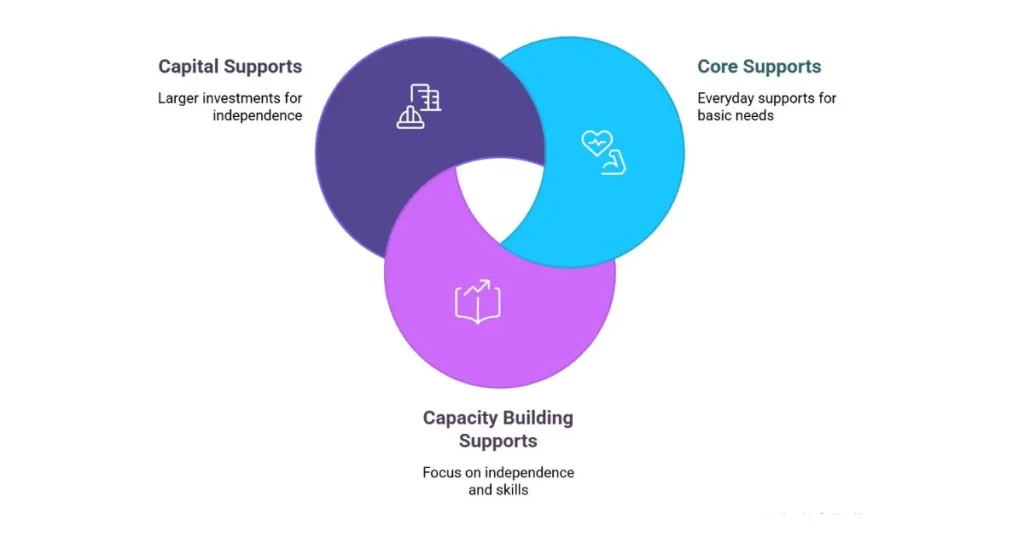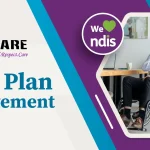The National Disability Insurance Scheme (NDIS) is one of the biggest programs in Australia that helps people with disabilities live a better life. It gives them the chance to get the care, services, and supports they need to live more independently. Since it started, thousands of Australians and their families have benefited from it.
But when people start learning about the NDIS, they often come across terms like NDIS service provider, NDIS provider, and NDIS support. These words may sound confusing at first, especially for people who are new to the system. They are often used, but many people are unsure of what they really mean. In this guide, we will explain them in very simple words. We will also look at the role of providers, the different types of support, how to choose the right provider, and why NDIS support is so important for participants and their families.
This blog will give you a full and clear idea of how the NDIS works, how providers help, and how supports can change lives.
Understanding the NDIS
The NDIS stands for the National Disability Insurance Scheme. It is managed by the National Disability Insurance Agency (NDIA). The goal of this program is simple: to provide support for Australians who have a permanent and significant disability.
Instead of giving the same type of help to everyone, the NDIS looks at each person as an individual. Every participant has their own needs, goals, and lifestyle. That’s why the NDIS offers personalised plans. These plans come with funding that participants can use to pay for the supports they need.
The main idea of the NDIS is choice and control. This means participants have the right to decide:
- What services do they want?
- Who will provide those services?
- How and when will the services be delivered?
This is very important because people with disabilities are not just receiving help — they are given the power to make decisions about their own lives.
What is an NDIS Service Provider?
An NDIS service provider is any person, business, or organisation that delivers services funded by the NDIS. These providers help participants in many ways, depending on what the participant’s plan allows.
Some providers are small businesses run by individuals, while others are large organisations that work across Australia. Regardless of size, their main role is to support participants in achieving their goals.
For example, a service provider could:
- Help a participant with personal care such as showering, dressing, or eating.
- Offer therapy sessions like physiotherapy, psychology, or speech therapy.
- Provide home modifications such as ramps or grab rails for safety.
- Supply equipment like wheelchairs, hearing aids, or mobility scooters.
- Arrange community activities to help participants connect with others.
The term “service provider” highlights the fact that they deliver services directly to participants.
The Main Types of NDIS Supports
The NDIS groups are supported into three main categories. This system helps participants clearly understand what type of funding they might receive and how it can be used to improve their daily lives.
Core Supports
These are everyday supports that cover basic and regular needs. They often include personal care, transport, and household chores. Under this category, participants may also access household tasks like cleaning, laundry, and meal preparation, which help them maintain a safe and healthy home. In some cases, assistive products for household tasks, such as special tools and equipment, are provided to make daily chores easier and more manageable.
Capacity Building Supports
This group of supporters focuses on building independence and skills for the future. It can include training, therapies, and programs that help participants reach personal goals. For example, physical wellbeing activities such as exercise programs or therapy sessions are offered to improve health and mobility. Participants may also access support coordination, which helps them understand their plan, connect with the right providers, and manage their services more effectively. Group or centre-based activities are another option under this category, giving participants the chance to learn new skills, socialise, and build confidence in a safe environment.
Capital Supports
These supports are usually larger or one-time investments. They include assistive technology, home modifications, or other essential equipment that improves independence. For example, plan management can be part of this category, where professionals handle the financial side of an NDIS plan to ensure funds are used correctly. Some participants may also access supported holidays, which are carefully planned trips that provide both fun and safe experiences, while still offering the care and assistance they need.
By dividing supports into these categories, the NDIS ensures that funding is used properly, and participants receive what they truly need to reach their goals and improve their quality of life.

Why NDIS Providers are Important
NDIS providers are more than just service givers. They play a very important role in the lives of participants. They are often the people participants and their families depend on every day.
Providers give more than practical help. They offer guidance, care, and understanding. They explain how services work, answer questions, and help participants feel comfortable. For many families, providers become trusted partners in their journey.
The presence of providers also gives participants peace of mind. They know that their needs will be met by trained people who follow safety and quality standards. This is especially true for registered providers, who go through strict checks before being approved.
How to Choose the Right NDIS Provider
Choosing a provider is one of the most important steps in the NDIS journey. The right provider can make a huge difference in the participant’s life. But how do you choose?
The first step is to be clear about your goals. Do you want to live more independently? Do you want to join community activities? Do you need regular therapy? Once you know your goals, it becomes easier to find a provider who matches your needs.
The next step is to check the provider’s experience. Some providers specialise in certain services, such as therapy or personal care, while others offer a wide range of supports. A provider who has experience in your area of need will likely be more helpful.
It’s also important to see how flexible the provider is. A good provider listens to your needs, respects your choices, and adapts their services when necessary. You should feel comfortable talking with them and asking questions.
Many participants also look at reviews or ask others for feedback. Hearing from people who have already used a provider can give you a good idea of what to expect.
Finally, check if the provider is registered. While non-registered providers can still give services, registered providers have been officially approved by the NDIA, which adds an extra layer of trust.
Benefits of NDIS Support
NDIS support changes lives. It allows people with disabilities to enjoy greater independence, join activities, and feel more included in society.
One of the biggest benefits is improved daily living. With the right support, participants can manage tasks like cooking, cleaning, or personal care with more ease. This reduces stress on families and carers as well.
Another benefit is better health. With access to therapies, assistive technology, and professional care, participants can improve both their physical and mental health.
Social inclusion is another big advantage. Many supports encourage participants to join group activities, events, or classes, which helps them build friendships and feel connected to their communities.
NDIS support also gives families peace of mind. They know their loved one is receiving proper care and has the chance to live a better life.
Challenges Participants Face
Even though the NDIS is designed to make life easier, participants can face some challenges. In some areas, there may not be enough providers, especially in rural or remote locations. This can make it hard to find the right support.
Sometimes, there are long waiting times for services or equipment. This can be frustrating, especially when a participant needs urgent help.
Another challenge is understanding the NDIS system itself. It can feel overwhelming at first, with so many rules, plans, and terms to learn.
Despite these challenges, good providers can make a big difference. They guide participants through the system, explain things in simple words, and make the process less stressful.

How Providers Support Families and Carers
NDIS support is not only designed for participants but also extends to families and carers who play a key role in daily care. Providers understand that carers often face physical, mental, and emotional pressures, so they offer different types of help to make life easier for the whole household.
Some of the main ways providers support families and carers include:
- Respite services: Giving carers short breaks so they can rest, recharge, and focus on their own wellbeing while knowing their loved one is cared for.
- Training and education: Teaching families how to use assistive technology, manage daily routines, or apply strategies that make care at home more effective.
- Emotional support: Offering counselling sessions or connecting families to community groups where they can share experiences and reduce feelings of isolation.
- Practical guidance: Helping carers understand the NDIS plan and making it easier for them to access the right services.
- Confidence building: Empowering families with knowledge and skills so they feel more prepared in supporting the participant.
By offering these supports, providers ensure families and carers feel valued, supported, and less overwhelmed, which improves the overall quality of life for everyone in the household.
The Future of NDIS Providers and Support
The NDIS is still developing, and the future looks promising. We may see more use of technology, such as apps, online platforms, and smart devices that make support easier to access.
There may also be a greater focus on education and employment opportunities, helping participants build careers and achieve independence.
As more providers enter the system, participants will have even more choice and flexibility. The aim is to create a system where every participant feels supported, valued, and empowered.
Frequently Asked Questions (FAQs)
1. What does an NDIS service provider do?
An NDIS service provider delivers the services and supports funded in a participant’s NDIS plan. This can include personal care, therapy, household help, assistive technology, or community activities.
2. Is there a difference between an NDIS provider and an NDIS service provider?
Both terms are often used in the same way. They refer to the person, business, or organisation that gives participants the support they need under the NDIS.
3. What types of supports can I get under the NDIS?
Supports can include daily living help, transport, therapies, assistive technology, group activities, supported holidays, and more. They are grouped into Core Supports, Capacity Building Supports, and Capital Supports.
4. Do I have to use a registered NDIS provider?
Not always. If your NDIS plan is self-managed or plan-managed, you can use both registered and non-registered providers. If your plan is NDIA-managed, you must use registered providers.
5. How do I choose the right NDIS provider?
Think about your goals, check the provider’s experience, ask questions, and make sure they listen to your needs. Reviews and recommendations can also help.
Conclusion
The NDIS has transformed disability support in Australia. By offering funding, services, and choice, it has given participants the ability to live more independently and with greater confidence.
An NDIS provider or NDIS service provider is someone who delivers the services that participants need. NDIS support is the actual assistance, therapy, or equipment received. Together, they create a strong support system that improves lives every day.
For participants and their families, the most important step is finding the right provider. A good provider listens, understands, and works closely with you to reach your goals. URCare Support Services, as a trusted NDIS service provider, is dedicated to offering personalised care and quality support that truly makes a difference.






